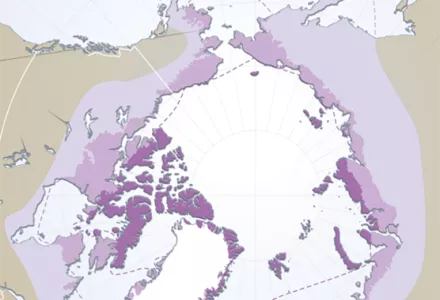Cooperation or Conflict in the Arctic: What to Do About Russia During a Climate Crisis?
How should we evaluate the costs and benefits of renewing cooperation with Russia on science and conservation?
How should we evaluate the costs and benefits of renewing cooperation with Russia on science and conservation?

In response to Russia's invasion of Ukraine, nearly all cooperation on Arctic science and conservation has ceased between the West and Russia, bringing to a halt thirty years of joint effort on fisheries and wildlife conservation, climate change research, protected areas management and other areas of environmental science.
This six-session study group, led by Arctic Initiative Senior Fellow Margaret Williams, explored the Arctic's unique environmental and cultural characteristics, as well as the key agreements and governance structures supporting environmental protection and sustainable development in the region. The group's objective was to evaluate the costs and benefits of renewing cooperation with Russia and develop recommendations that could be shared with key government agencies in the United States or other Western countries regarding future cooperation in the science and conservation arenas.
Classes were a combination of presentations by the study group leader and guest speakers; student presentations; and at least one debate. Guest speakers included scientists, Arctic experts from NGOs, and government representatives.
The application deadline has passed.
Meets: 4:45-6:00pm ET from February 14 to March 27 (excluding March 13)
Session topics and format may be subject to change.
Session 1 | February 14
Setting the Stage: The first session will provide general background on the Arctic, including the region's environment, biodiversity, natural resources, peoples, and connection to the global climate. Guest speaker, Arctic Initiative Senior Fellow Jennifer Spence, will give an overview of Arctic governance before and after the invasion of Ukraine on February 24, 2022. The group will also discuss the format for the other sessions.
Session 2 | February 21
News from the Frontlines: The second session will cover achievements, failures, and challenges in Russian conservation, as well as the environmental impacts of the war in Ukraine.
Session 3 | February 28
Costs and Benefits of Cooperation: Students will research and present on the potential benefits and risks of resuming cooperation with Russia, with reference to various historical efforts.
Session 4 | March 6
Debate: The West should not engage with Russia on any science or conservation activities until Russia leaves Ukraine.
Session 5 | March 20
Current and Future Cooperation: Students will present on whether, when, and how to move forward with cooperation between the West and Russia. Should ethical/moral principles be considered, or is a purely practical approach needed? What are the necessary conditions to be met by Russia, if any, in order for relations to resume? Are new mechanisms available for coordinating contacts with Russia? What sort of financial support is appropriate, and how to distribute it? Could third parties moderate?
Session 6 | March 27 (Tentative)
The format of the final session will be determined by the study group participants.